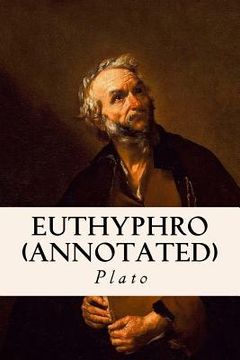Reseña del libro "Euthyphro (annotated) (en Inglés)"
In the Euthyphro, Socrates is awaiting his trial for impiety. But before the trial begins, Plato would like to put the world on their trial, and convince them of ignorance in that very matter touching which Socrates is accused. An incident which may perhaps really have occurred in the family of Euthyphro, a learned Athenian diviner and soothsayer, furnishes the occasion of the discussion. Translated by B. Jowett. The Euthyphro dialogue occurs near the court of the Archon basileus (Magistrate-king), where Socrates and Euthyphro encounter each other; each man is present at the court for the preliminary hearings to possible trials (2a). Euthyphro has come to present charges of murder against his father, who had allowed one of his workers to die of exposure to the elements without proper care and attention. (3e-4d) The dead worker, earlier had killed a slave from the family estate on Naxos Island. As Euthyphro's father awaited to hear from the exegetes (cf. Laws 759d) about how to proceed, the bound-and-gagged worker died in a ditch. Socrates is astonished by Euthyphro's confidence in being able to prosecute his own father for the serious charge of manslaughter, despite the fact that Athenian Law allows only relatives of the dead man to file suit for murder. Euthyphro dismisses the astonishment of Socrates, which confirms his overconfidence in his own critical judgement of matters religious and ethical. In an example of Socratic irony, Socrates says that Euthyphro obviously has a clear understanding of what is pious and impious Because he is facing a formal charge of impiety, Socrates expresses the hope to learn from Euthyphro, all the better to defend himself in the trial. Euthyphro says that what lies behind the charge of impiety presented against Socrates, by Meletus and the others, is Socrates' claim that he is subjected to a daimon, (divine sign) which warns him of various courses of action. (3b) From the perspective of some Athenians, Socrates expressed scepticism of the accounts about the Greek gods, which he and Euthyphro briefly discuss, before proceeding to the main argument of their dialogue: the definition of "piety". Moreover, Socrates further expresses critical reservations about such divine accounts that emphasise the cruelty and inconsistent behaviour of the Greek gods, such as the castration of the early sky-god Uranus, by his son Cronus; a story Socrates said is difficult to accept. (6a-6c) After claiming to know and be able to tell more astonishing divine stories, Euthyphro spends little time and effort defending the conventional, Greek view of the gods. Instead, he is led to the true task at hand, as Socrates forces him to confront his ignorance, by pressing Euthyphro for a definition of "piety"; yet, Socrates finds flaw with each definition of "piety" proposed by Euthyphro.(6d ff.) At the dialogue's conclusion, Euthyphro is compelled to admit that each of his definitions of "piety" has failed, but, rather than correct his faulty logic, he says that it is time for him to leave, and excuses himself from their dialogue. To that end, Socrates concludes the dialogue with Socratic irony: Since Euthyphro was unable to define "piety", Euthyphro has failed to teach Socrates about piety. Therefore, from his dialogue with Euthyphro, Socrates received nothing helpful to his defense against a formal charge of impiety

